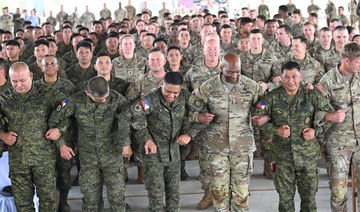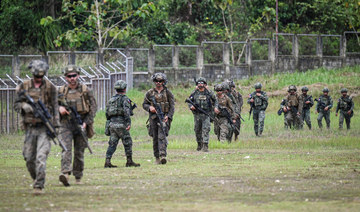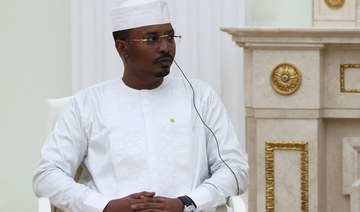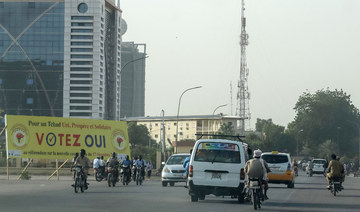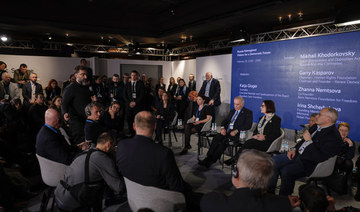PORT-AU-PRINCE, Haiti: Haiti’s interim government said Friday that it asked the US to deploy troops to protect key infrastructure as it tries to stabilize the country and prepare the way for elections in the aftermath of the assassination of President Jovenel Moïse.
“We definitely need assistance and we’ve asked our international partners for help,” Interim Prime Minister Claude Joseph told The Associated Press in an interview, declining to provide further details. “We believe our partners can assist the national police in resolving the situation.”
Joseph said that he was dismayed by opponents who’ve tried to take advantage of Moïse’s murder to seize political power — an indirect reference to a group of lawmakers have declared their loyalty and recognized Joseph Lambert, the head of Haiti’s dismantled senate, as provisional president and Ariel Henry, whom Moïse designated as prime minister a day before he was killed, as prime minister.
“I’m not interested in a power struggle,” Joseph said in the brief phone interview, without mentioning Lambert by name. “There’s only one way people can become president in Haiti. And that’s through elections.”
Joseph spoke just hours after the head of Colombia’s police said that the Colombians implicated in Moïse’s assassination were recruited by four companies and traveled to the Caribbean nation in two groups via the Dominican Republic. Meanwhile, the US said it would send senior FBI and Homeland Security officials to help in the investigation.
Haitian National Police Chief Léon Charles said 17 suspects have been detained in the brazen killing of Moïse that stunned a nation already reeling from poverty, widespread violence and political instability.
As the investigation moved forward, the killing took on the air of a complicated international conspiracy. Besides the Colombians, among those detained by police were two Haitian Americans, who have been described as translators for the attackers. Some of the suspects were seized in a raid on Taiwan’s Embassy where they are believed to have sought refuge.
At a news conference in Colombia’s capital of Bogota, Gen. Jorge Luis Vargas Valencia said four companies had been involved in the “recruitment, the gathering of these people” implicated in the assassination, although he did not identify the companies because their names were still being verified.
Two of the suspects traveled to Haiti via Panama and the Dominican Republic, Vargas said, while a second group of 11 arrived in Haiti on July 4 from the Dominican Republic.
In Washington, White House Press Secretary Jen Psaki said senior FBI and Department of Homeland Security officials will be sent to Haiti “as soon as possible to assess the situation and how we may be able to assist.”
“The United States remains engaged and in close consultations with our Haitian and international partners to support the Haitian people in the aftermath of the assassination of the president,” Psaki said.
Following Haiti’s request for US troops, a senior administration official reiterated Psaki’s earlier comments that the administration is sending officials to assess how it can be most helpful, but added there are no plans to provide military assistance at this time.
In Haiti, National Police Chief Léon Charles said another eight suspects were still at large and being sought.
Investigative Judge Clément Noël told the French-language newspaper Le Nouvelliste that the Haitian Americans arrested, James Solages and Joseph Vincent, said the attackers originally planned only to arrest Moïse, not kill him. Noël said Solages and Vincent were acting as translators for the attackers, the newspaper reported Friday.
The same newspaper quoted Port-au-Prince prosecutor Bed-Ford Claude as saying he ordered an investigative unit of the National Police Force to interrogate all the security agents close to Moïse. These include Moise’s security coordinator Jean Laguel Civil and Dimitri Hérard, head of the General Security Unit of the National Palace.
“If you are responsible for the president’s security, where have you been? What did you do to avoid this fate for the president?” Claude said.
The attack, which took place at Moïse’s home before dawn Wednesday, also seriously wounded his wife, who was flown to Miami for treatment.
Joseph assumed leadership with the backing of police and the military and declared a two-week “state of siege.” Port-au-Prince already has been on edge amid the growing power of gangs that displaced more than 14,700 people last month alone as they torched and ransacked homes in a fight over territory.
The killing brought the usually bustling capital to a standstill, but Joseph urged the public to return to work.
Vargas has pledged Colombia’s full cooperation, and authorities there identified 13 of the 15 Colombians implicated in the attack as retired members of the military, 11 captured and two killed. They range in rank from lieutenant colonel to soldier.
The commander of Colombia’s Armed Forces, Gen. Luis Fernando Navarro, said they had left the institution between 2018 and 2020.
“In the criminal world, there is the concept of murder for hire and this is what happened: they hired some members of the (army) reserve for this purpose and they have to respond criminally for the acts they committed,” said retired Colombian army general Jaime Ruiz Barrera.
Senior officials from Colombia’s security forces will travel to Haiti to help with the investigation.
US-trained Colombian soldiers are heavily recruited by private security firms in global conflict zones because of their experience in a decades-long war against leftist rebels and powerful drug cartels.
The wife of one former Colombian soldier in custody said he was recruited by a security firm to travel to the Dominican Republic last month.
The woman, who identified herself only as “Yuli,” told Colombia’s W Radio that her husband, Francisco Uribe, was hired for $2,700 a month by a company named CTU to travel to the Dominican Republic, where he was told he would provide protection to some powerful families. She says she last spoke to him at 10 p.m. Wednesday — almost a day after Moïse’s killing— and said he was on guard duty at a house where he and others were staying.
“The next day he wrote me a message that sounded like a farewell,” the woman said. “They were running, they had been attacked. ... That was the last contact I had.”
The woman said she knew little about her husband’s activities and was unaware he had even traveled to Haiti.
Uribe is under investigation for his alleged role in extrajudicial killings by Colombia’s US-trained army more than a decade ago. Colombian court records show he and another soldier were accused of killing a civilian in 2008 who they later tried to present as a criminal killed in combat.
The CTU in question may be CTU Security in Miami-Dade. The business has two listed addresses on its website. One was a shuttered warehouse with no sign indicating who it belonged to. The other is a simple office under a different company’s name where the receptionist says the CTU owner comes once a week to collect meal and hold the occasional meeting.
The US State Department said it was aware of reports Haitian-Americans were in custody but would not comment.
Solages, 35, described himself as a “certified diplomatic agent,” an advocate for children and budding politician on a now-removed website for a charity he started in 2019 in south Florida to assist resident of his home town of Jacmel, on Haiti’s southern coast.
Solages also said he had worked as a bodyguard at the Canadian Embassy in Haiti, and on his Facebook page, which was also taken down after news of his arrest, he showcased photos of armored military vehicles and a shot of himself standing in front of an American flag.
Canada’s foreign relation department released a statement that did not refer to Solages by name but said one of the men detained for his alleged role in the killing had been “briefly employed as a reserve bodyguard” at its embassy by a private contractor.
Calls to the charity and Solages’ associates went unanswered. However, a relative in south Florida said Solages doesn’t have any military training and doesn’t believe he was involved in the killing.
“I feel like my son killed my brother because I love my president and I love James Solages,” Schubert Dorisme, whose wife is Solages’ aunt, told WPLG in Miami.
Taiwan’s Embassy in Port-au-Prince said police had arrested 11 individuals who tried to break into the compound early Thursday. It gave no details of their identities or a reason for the break-in but in a statement referred to the men as “mercenaries” and strongly condemned the “cruel and barbaric assassination” of Moïse.
“As for whether the suspects were involved in the assassination of the president of Haiti, that will need to be investigated by the Haitian police,” Foreign Affairs spokesperson Joanne Ou told The Associated Press in Taipei.
Police were alerted by embassy security while Taiwanese diplomats were working from home. Haiti is one of a handful of countries with diplomatic relations with Taiwan.
Officials have disclosed little about the killing, other than to say the attack was carried out by “a highly trained and heavily armed group.”
Haiti’s interim PM confirms request for US troops to country
https://arab.news/ne4qw
Haiti’s interim PM confirms request for US troops to country
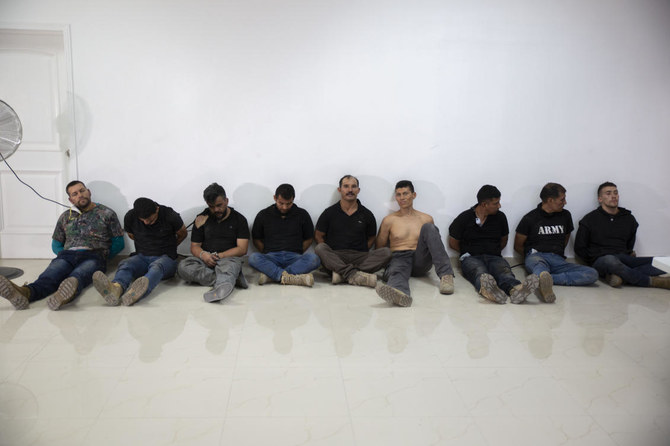
No place to pray for Muslim workers in Italian city

- Urban planning regulations tightly limit the establishment of places of worship, mayor says
- Islam is not among the 13 religions that have official status under Italian law
They are just a fraction of the city’s Muslims who since November have been banned from praying inside their two cultural centers by Monfalcone’s far-right mayor.
Instead, they assemble in this privately owned construction site as they await a court decision later this month to settle a zoning issue they say has barred their constitutional right to prayer.
Among them is Rejaul Haq, the property’s owner, who expresses frustration over what he and many other Muslims see as harassment by the city they call home.
“Tell me where I should go? Why do I have to go outside of Monfalcone? I live here, I pay taxes here!” lamented Haq, a naturalized Italian citizen who arrived from Bangladesh in 2006.
“Catholics, Orthodox, Protestants, Jehovah’s, if they all have their church — why can’t we have one?”
Immigrants make up a third of this city of 30,000 inhabitants outside Trieste, most of them Bangladeshi Muslims who began arriving in the late 1990s to build cruise-liners for ship builder Fincantieri, whose Monfalcone shipyard is Italy’s largest.
Their presence is immediately visible, whether the Bangladeshi men on bicycles peddling to and from work or the ethnic grocery stores on street corners.
For Mayor Anna Cisint, the restriction on prayer is about zoning, not discrimination.
Urban planning regulations tightly limit the establishment of places of worship, and as a mayor in a secular state, she says it is not her job to provide them.
“As a mayor, I’m not against anybody, I wouldn’t even waste my time being against anybody, you see, but I’m also here to enforce the law,” Cisint said.
Still, she argues the number of Muslim immigrants, boosted by family reunifications and new births, has become “too many for Monfalcone.”
“There are too many... you have to tell it like it is,” she said.
Her warnings about the “social unsustainability” of Monfalcone’s Muslim population have propelled Cisint to national headlines in recent months.
They have also assured her a spot in upcoming European Parliament elections for Matteo Salvini’s anti-immigrant League party, part of Prime Minister Giorgia Meloni’s coalition government.
The League for decades has obstructed mosque openings in its stronghold of northern Italy. But the problem is nationwide in Catholic-majority Italy.
Islam is not among the 13 religions that have official status under Italian law, which complicates efforts to build places of worship.
There are currently fewer than 10 officially recognized mosques, said Yahya Zanolo of the Italian Islamic Religious Community (COREIS), one of the country’s main Muslim associations.
That means that out of Italy’s estimated more than two million Muslims, most are relegated to thousands of makeshift places of worship that “feed prejudice and fear in the non-Muslim population,” said Zanolo.
Cisint, who has been under police protection since receiving online death threats in December, complains about a resistance to integration by what she called a “very closed” community.
She asks why Arabic and not Italian is taught in the community centers and calls “intolerable” wives walking behind husbands or schoolgirls in veils.
In the run-up to European elections, the League has once again seized on illegal immigration to Italy — where nearly 160,000 migrants arrived by boat last year, mostly from Muslim countries — as a vote-winner.
Salvini has called the June vote “a referendum on the future of Europe,” to decide “whether Europe will still exist or whether it will be a Sino-Islamic colony.”
But Monfalcone’s Muslims don’t fit the stereotypes exploited by the League, armed as they are with work permits or passports.
“It’s not like we came here to see the beautiful city of Monfalcone,” jokes Haq. “It’s because there’s work here.”
Many Muslims said they feel a palpable sense of distrust, if not outright hatred, from some of the long-time residents.
Ahmed Raju, 38, who works at Fincantieri installing panels, has mostly prayed at home since the cultural centers have been off-limits.
Such is the reach of the mayor’s rhetoric that “even I get scared” about Muslims, Raju said.
Of the prejudice the community faces, Raju added: “You feel like you’re in front of a big wall, that you can’t break down.”
“We’re foreigners. We can’t change the situation.”
Outside a classroom where volunteers teach Italian to recently immigrated women, Sharmin Islam, 32, said the animosity is acutely felt by her young son who was born in Italy.
“He comes back from school and asks, ‘Mum, are we Muslims bad?’”
An administrative court in Trieste will rule on May 23 whether to uphold or strike down the mayor’s ban on prayer within the cultural centers.
Haq says Monfalcone’s Muslims have “no Plan B” if they lose, but worries even if they win the scars from the stand-off will remain.
Meanwhile Cisint has been actively promoting her book, “Enough Already: Immigration, Islamization, Submission,” warning Monfalcone’s situation could be duplicated elsewhere.
On a recent public holiday, Bangladeshis filled the city’s main square, from little girls with unicorn balloons to groups of young men enjoying a day off.
Looking on was barman Gennaro Pomatico, 24.
“The locals won’t ever accept them,” said Pomatico.
“But ultimately they don’t bother anyone.”
Philippines, US fire at ‘invasion’ force in South China Sea war games
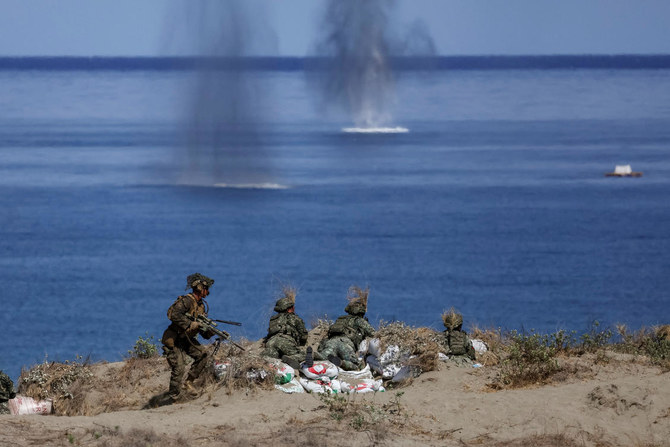
- Thousands of troops are conducting maneuvers against a backdrop of increased confrontations between Chinese and Filipino vessels around shoals in the South China Sea
LAOAG, Philippines: US and Filipino troops fired missiles and artillery at an imaginary “invasion” force during war games on the Philippines’ northern coast Monday, days after their governments objected to China’s “dangerous” actions in regional waters.
Thousands of troops are conducting land, sea and air maneuvers against a backdrop of increased confrontations between Chinese and Filipino vessels around shoals in the South China Sea claimed by Manila, as well as stepped-up Chinese air and naval activity around nearby self-ruled Taiwan.
US troops massed at a strip of sand dunes on Luzon island’s northwest coast — around 400 kilometers south of Taiwan — let loose more than 50 live 155mm howitzer rounds at floating targets about five kilometers off the coast, AFP journalists saw.
Filipino troops followed up by firing rockets aimed at wearing down the attackers, before the two forces finished the job with machine guns, Javelin missiles and more artillery rounds.
Lt. Gen. Michael Cederholm, commander of the US First Marine Expeditionary Force, said the exercise was “to prepare for the worst” by “securing key maritime terrain.”
“It’s designed to repel an invasion,” Cederholm told reporters at the exercise site.
“Our northwestern side is more exposed,” Major General Marvin Licudine, exercise director for the Filipinos, said ahead of the live firing at the La Paz sand dunes near Laoag city.
“Because of the regional problems that we have... we have to already practice and orient ourselves in our own land in these parts,” he added.
Beijing claims almost the entire South China Sea despite an international ruling that its assertion has no legal basis.
It deploys hundreds of coast guard, navy and other vessels to patrol and militarise the waters.
Just last week, Manila said the China Coast Guard damaged a Philippine Coast Guard ship and another government vessel in water cannon attacks around the disputed China-controlled Scarborough Shoal in the South China Sea on April 30.
More than 16,700 Filipino and American troops are taking part in the annual military drills — dubbed Balikatan, or “shoulder to shoulder” in Tagalog — in multiple locations across the Asian archipelago.
Maritime confrontations between China and the Philippines have raised fears of a wider conflict that could involve the United States and other allies.
Monday’s exercise came days after the defense ministers of the Philippines, the United States, Japan and Australia met in Hawaii and issued a joint statement on their strong objections to the “dangerous and destabilising conduct” of China in the South China Sea.
The ministers “discussed opportunities to further advance defense cooperation” and to “work together to support states exercising their rights and freedoms in the South China Sea.”
Last week, US forces taking part in the Balikatan exercises fired HIMARS precision rockets into the South China Sea from the western island of Palawan, the nearest major Philippine landmass to the hotly disputed Spratly Islands.
The US Marine Corps said the maneuver was a rehearsal for the rapid deployment of the missile system across the Philippines’ South China Sea coast to “secure and protect Philippines’ maritime terrain, territorial waters and exclusive economic zone interests.”
The confrontations between the Philippines and China comes as tensions have ratcheted up between Beijing and Taipei, which is about to inaugurate a new president regarded by China as a dangerous separatist.
Taiwan’s defense ministry said Friday it had detected 26 Chinese aircraft and five naval vessels around the self-ruled island in the previous 24 hours.
“To a degree, military exercises are a form of deterrence,” Philippine Foreign Secretary Enrique Manalo was quoted as saying in remarks delivered on his behalf by an aide at a public workshop on Friday.
“The more we simulate, the less we actuate,” he added.
Italy’s pragmatic prime minister leads charge for EU far right
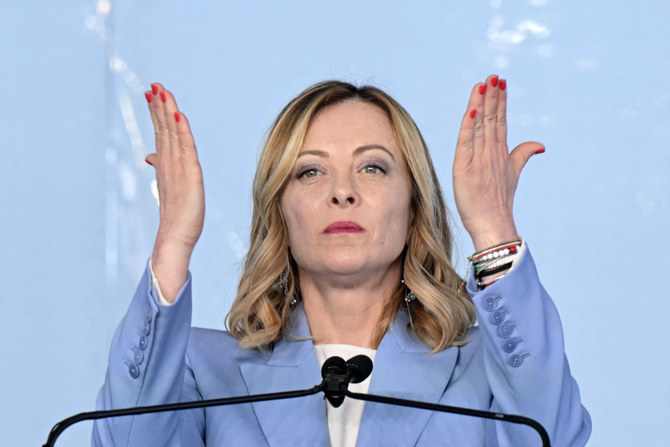
- Her strong support for Ukraine has won her friends in Washington and Brussels, particularly after she helped persuade Hungary’s Viktor Orban to drop his veto of EU aid to Kyiv
- Meloni has also worked closely with European Commission President Ursula von der Leyen, particularly on migration, a priority for the far-right premier
ROME: Having fostered pragmatic relations with Brussels, Italy’s Giorgia Meloni is for many the “moderate” face of Europe’s radical right — and is leading the charge for June elections.
The ascent to power of Meloni’s post-fascist, euroskeptic Brothers of Italy in 2022 sent shockwaves through the European Union, sparking fears of a lurch to the right within a founding member of both the bloc and NATO.
But her strong support for Ukraine has won Meloni friends in Washington and Brussels, particularly after she helped persuade Hungary’s Viktor Orban — a long-time ally sympathetic to Moscow — to drop his veto of EU aid to Kyiv.
Meloni has also worked closely with European Commission President Ursula von der Leyen, particularly on migration, a priority for the far-right premier.
“At a European level, she’s trying to present herself as a sort of moderate conservative and mediator” with the rest of the radical right, noted Lorenzo Castellani, a political analyst at Rome’s LUISS University.
At home, Meloni has pursued a nationalist populist agenda focused on traditional family values, law and order, and migration, including a clampdown on rescue ships operating in the central Mediterranean.
It has raised hackles among the Italian left — particularly moves to exert influence over the RAI public state broadcaster — but nothing yet to spark alarm in Brussels, as with judicial reforms in Hungary and Poland.
Fiscal policy meanwhile has been relatively prudent, reflecting the constraints of being part of the EU’s single currency.
“She wants to be in many aspects the acceptable extreme for the rest of the European political establishment,” Castellani told AFP.
“She’s like the last island before the border.”

“More credible”
Meloni heads the European Conservatives and Reformists (ECR) group in the European Parliament, which includes Spain’s Vox, Poland’s populist Law and Justice (PiS), and France’s Reconquete!.
Marked by a pro-Ukraine, pro-NATO stance, it is viewed as more credible by the Brussels establishment than the other far-right grouping, the euroskeptic Identity and Democracy group (ID).
ID includes Marine Le Pen’s National Rally (RN) in France, Germany’s anti-immigrant AfD and Meloni’s own coalition ally, Matteo Salvini’s far-right League.
Rosa Balfour, director of the Carnegie Europe think tank, says both Rome and Brussels have benefited from a pragmatic working relationship.
“What the Commission has been doing is embrace Meloni and isolate Orban,” who is not part of either grouping, she told AFP.
“And that’s worked very well for Italy because Meloni has managed to extract concessions.”
This has mainly entailed EU support for the premier’s efforts to stop the tens of thousands of migrants who land on Italy’s shores each year on boats from North Africa.
Von der Leyen joined Meloni on the island of Lampedusa last year after a surge in arrivals, and the two women joined EU delegations to Egypt and Tunisia in recent months to agree new deals on energy and migration.
Building bridges
Analysts say the shift to a tougher EU approach on migration was well underway before Meloni arrived — but that has not stopped her claiming credit.
“We want Italy to be central to changing what doesn’t work in Europe,” she said during her election campaign launch last month.
She is standing in the vote — despite an EU rule barring government ministers from taking up their seats — and urged the European right to follow her example.
“We want to do in Europe exactly what we did in Italy on September 25, 2022,” she said.
But Castellani calls this a “bluff.”

“The real game she’s playing is trying to enter within the European game of alliances,” he said, notably building bridges between the ECR and Von der Leyen’s conservative European People’s Party (EPP).
The divisions in the European right are echoed within Meloni’s coalition, notably between her and Salvini — they share similar domestic priorities but differ on foreign affairs.
Salvini’s League has a history of warm ties with Moscow, while he never misses an opportunity to criticize Brussels.
But he has been eclipsed. The League came top in 2019 European elections in Italy with 34 percent, but is now polling closer to eight percent, compared to more than 27 percent for Meloni’s Brothers of Italy.
Fresh face, skilled communicator
Surveys show voters are supportive of Meloni’s foreign policy — and less so of her migration efforts — but Lorenzo Pregliasco, founder of polling company YouTrend, says personality plays a big role.
Meloni is also seen as “more credible” than other Italian leaders, a skilled communicator and a “genuine figure, someone who says what she thinks,” he told AFP.
He notes her 2022 victory was driven by her image as a fresh face, the only party leader who did not join Mario Draghi’s technocratic government.
With the opposition still divided, as they were back then, he predicts she could stay in power for the full five-year term.
But by then the political landscape may be very different, not least if Donald Trump wins the November US presidential election.
Balfour suggests Meloni may have to reposition herself.
If Trump wins, “then you’ve got all the political leaders elbowing each other to lead the right. And Orban has already positioned himself there.”
Chad votes in first Sahel presidential poll since wave of coups
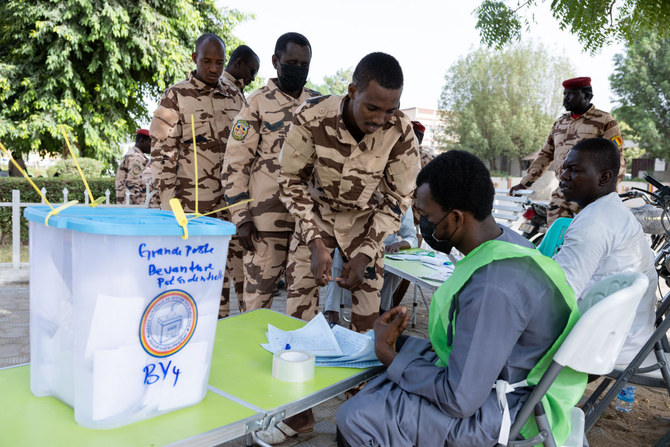
- Monday's vote pits military ruler Mahamat Idriss against his prime minister Succes Masra, previously a political opponent who fled into exile in 2022 but was allowed back a year later
N’DJAMENA: Chadians go to the polls on Monday three years after their military leader seized power, in the first presidential election in Africa’s Sahel region since a wave of coups.
Analysts say Mahamat Idriss Deby, who seized power the day rebels killed his long-ruling father Idriss Deby in April 2021, is most likely to win, although his chief opponent has been drawing larger-than-expected crowds on the campaign trail.
Deby has promised to bolster security, strengthen the rule of law and increase electricity production.
The vote coincides with a temporary withdrawal of US troops from Chad, an important Western ally in a region of West and Central Africa courted by Russia and wracked by jihadism.
Polls open at 7 a.m. and close at 5 p.m., with some 8.5 million people registered to vote.
Soldiers began early voting on Sunday.
Provisional results are expected by May 21 and final results by June 5. If no candidate wins more than 50 percent of the votes, a run-off will be held on June 22.
Since replacing his father at the helm of the oil-producing Central African country, Deby has remained close with former colonial power and longtime ally France.
While other junta-ruled Sahel countries including Mali, Burkina Faso and Niger have told Paris and other Western powers to withdraw and turned to Moscow for support, Chad remains the last Sahel state with a substantial French military presence.
The US, however, announced a temporary withdrawal of at least some troops last month, saying it would continue with a review of security operations after the election.
Opposition concerns
Monday’s vote pits Deby against his prime minister Succes Masra, previously a political opponent who fled into exile in 2022 but was allowed back a year later. Also running are former prime minister Albert Pahimi Padacke and seven other candidates.
Yaya Dillo, an opposition politician who had been expected to run against Deby despite coming from the same clan, was shot and killed in the capital N’Djamena on Feb. 28, the day the election date was announced.
Padacke has accused Masra of collaborating with Deby. But Masra has attracted large crowds to his own rallies.
Some opposition members and civil society groups have called for a boycott, citing concerns about possible vote-rigging.
That has raised fears of potential violence.
“This presidential election is of capital importance for the country because an entire people aspires for change,” said Baniara Yoyana, a former minister and magistrate.
“The process must be conducted with transparency to avoid any risk of confrontation.”
One Deby supporter, however, said he expected no problems.
“We want the election to go well and peacefully,” said Abdelkhader Sougui, a 28-year-old student.
“My wish is to go out and vote the morning of May 6 to confirm our victory... in the first round.”
Exiled Russian historian rallies fellow emigrants in dark times

- Tamara Eidelman is part of a group of exiled anti-war Russian public intellectuals and cultural figures who are rebuilding their careers abroad
- More than 800,000 Russians are estimated to have left the country in just the past two years after Russia invaded Ukraine
WASHINGTON: Russian dissident historian Tamara Eidelman was on vacation in Greece when Moscow’s tanks rolled into Ukraine in February 2022 and she realized that she would not be going back to her home country.
With her single suitcase, Eidelman, 65, flew to Portugal, where her daughter had been living, and began a new life in exile.
“I am operating under the assumption that I will not return. I am building my life in Portugal,” Eidelman, who has over 1.6 million followers on her history channel on YouTube, told AFP. “I want to come back... but if I sit every day thinking ‘When will it finally happen?’ I will go mad.”
Eidelman, who was declared a “foreign agent” by the government in Moscow, is part of a group of exiled anti-war Russian public intellectuals and cultural figures who are rebuilding their careers abroad.
While they cater to a large diaspora — more than 800,000 Russians are estimated to have left the country in just the past two years — unlike the previous waves of emigration from Russia’s calamities, they are able to continue speaking to those who stayed via social media, despite growing government restrictions.
“I think it’s one of the advantages of today’s emigration, if there can be any advantages, that our ties with our homeland have not been ruptured so drastically,” Eidelman, who wore a pin in the colors of the Ukrainian flag on her black blouse, said before a lecture in a community center outside Washington.
“Today there is an opportunity to exchange ideas. And, despite all the bans, inside Russia you can still access what is being done by those who emigrated. It is extremely valuable, it must be used and cherished.”

While exiles are unlikely to have a significant impact on political life inside Russia, “they can be the keepers of ideas, the centers of expertise and civic education,” according to Alexander Morozov, a political analyst and lecturer at Charles University in Prague.
When political change occurs, “Those who have retained trust and their symbolic capital can play a role in Russia’s renewal,” he wrote in a recent paper.
During her first few months in Portugal, Eidelman, who worked as a history teacher at a prestigious Moscow school for more than 30 years before becoming an editor, blogger and public speaker, kept herself busy looking for a place to live, reassembling her YouTube team and signing up for Portuguese lessons.
But she would catch herself thinking she was there on a brief visit and that she needed to buy a bottle of Port wine to bring back to Moscow to her mother and friends. Then it hit her.
“I felt a tremendous weight pressing on me when things had settled down a little and I realized that I am going to be in this wonderful, beautiful country for a long time,” she said. “Of course, (President Vladimir Putin’s) regime will collapse, but I don’t know if I will be around to see it.”
Since the start of Russia’s full-scale invasion, Eidelman’s YouTube channel has ballooned from some 500,000 followers to 1.63 million and a team of 30 people, with lectures on Russian, Ukrainian and world history — as well as a special presentation on Putin’s assault on democracy, which she delivered in a T-shirt that read “No Putin No War.”
“I want to express my unconditional support for Ukraine in this war and I believe that all its territories, including Crimea, must be returned to it,” Eidelman told AFP, referring to the Black Sea peninsula that Russia annexed in 2014.
During her lecture in an auditorium of several hundred Russian speakers titled “The Judgment of History,” Eidelman examined the painful questions of countries’ and societies’ culpability and responsibility for crimes from ancient Greece to Nazi Germany — with the clear undertone of Russia’s war in Ukraine.
Prosecuting those who committed direct crimes against Ukraine will not be enough, Eidelman suggested in her interview with AFP.
“I believe that there cannot be collective responsibility, that a whole people cannot be guilty,” she told AFP. “But at the same time, there must be... moral responsibility, responsibility before one’s conscience.”
Alina, a 39-year-old Russia-born quality control manager drove more than eight hours to Washington from the southern US state of Tennessee with her husband and two children to hear Eidelman speak.
To Alina, Russia’s invasion of Ukraine is “a crime against a neighboring country, but it’s also a crime against my own country because crimes are being committed in the name of people like me, who don’t agree with it.”
In these tragic times, Eidelman’s talk was a breath of fresh air, Alina said.
“When I listen to her lectures, I believe that there is — if not hope, then at least some light ahead for you to follow,” she said. “You get the feeling that you are not alone in all of this, even though physically you live apart from everyone.”
md/bgs/caw



